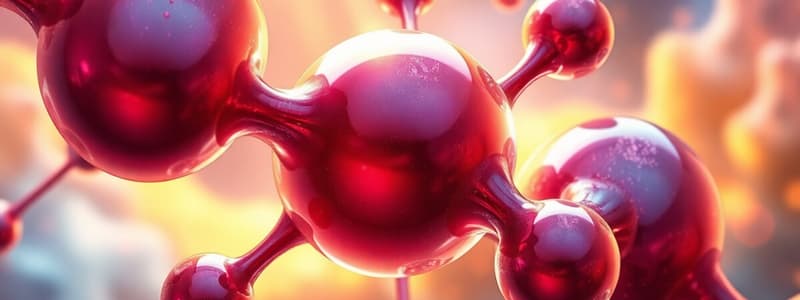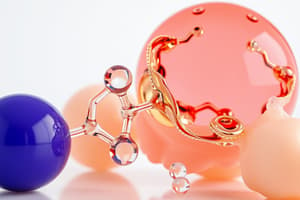Podcast
Questions and Answers
What type of intramolecular force is present in H₂O?
What type of intramolecular force is present in H₂O?
Which property is primarily affected by intermolecular forces?
Which property is primarily affected by intermolecular forces?
What is responsible for the high boiling point of water?
What is responsible for the high boiling point of water?
Which type of force primarily determines the solubility of a substance in water?
Which type of force primarily determines the solubility of a substance in water?
Signup and view all the answers
Sodium chloride (NaCl) has a high melting point due to which intramolecular force?
Sodium chloride (NaCl) has a high melting point due to which intramolecular force?
Signup and view all the answers
What type of intermolecular force is primarily responsible for the solubility of sugar in water?
What type of intermolecular force is primarily responsible for the solubility of sugar in water?
Signup and view all the answers
What can be said about the strength of intermolecular forces compared to intramolecular forces?
What can be said about the strength of intermolecular forces compared to intramolecular forces?
Signup and view all the answers
Which molecule is expected to have the lowest boiling point based on its intermolecular forces?
Which molecule is expected to have the lowest boiling point based on its intermolecular forces?
Signup and view all the answers
Why does oil (C₆H₁₄) not dissolve in water?
Why does oil (C₆H₁₄) not dissolve in water?
Signup and view all the answers
What enables NaCl to conduct electricity when dissolved in water?
What enables NaCl to conduct electricity when dissolved in water?
Signup and view all the answers
Which substance is likely to have a higher boiling point?
Which substance is likely to have a higher boiling point?
Signup and view all the answers
Which of the following compounds will likely dissolve in water?
Which of the following compounds will likely dissolve in water?
Signup and view all the answers
What type of forces determine a compound's ability to conduct electricity?
What type of forces determine a compound's ability to conduct electricity?
Signup and view all the answers
What characteristic does viscosity measure?
What characteristic does viscosity measure?
Signup and view all the answers
Which of the following statements is true about ethanol (C₂H₅OH)?
Which of the following statements is true about ethanol (C₂H₅OH)?
Signup and view all the answers
Which factor contributes to a substance being a gas at room temperature?
Which factor contributes to a substance being a gas at room temperature?
Signup and view all the answers
Which of the following compounds has weaker intermolecular forces?
Which of the following compounds has weaker intermolecular forces?
Signup and view all the answers
What type of intermolecular forces do polar liquids exhibit that increases their viscosity?
What type of intermolecular forces do polar liquids exhibit that increases their viscosity?
Signup and view all the answers
Flashcards
Intramolecular Force
Intramolecular Force
The forces that hold atoms together within a molecule or compound. They are strong and determine the type of substance.
Covalent Bond
Covalent Bond
A type of intramolecular force where electrons are shared between atoms. This type of bonding is common in many organic molecules.
Ionic Bond
Ionic Bond
A type of intramolecular force where electrons are transferred from one atom to another, creating oppositely charged ions. This type of bonding is found in salts.
Metallic Bond
Metallic Bond
Signup and view all the flashcards
Intermolecular Force
Intermolecular Force
Signup and view all the flashcards
What affects boiling point?
What affects boiling point?
Signup and view all the flashcards
Why does NaCl have a high melting point?
Why does NaCl have a high melting point?
Signup and view all the flashcards
Solubility: Like Dissolves Like
Solubility: Like Dissolves Like
Signup and view all the flashcards
Ionic compounds and conductivity
Ionic compounds and conductivity
Signup and view all the flashcards
Covalent compounds and conductivity
Covalent compounds and conductivity
Signup and view all the flashcards
Viscosity
Viscosity
Signup and view all the flashcards
Boiling point and intermolecular forces
Boiling point and intermolecular forces
Signup and view all the flashcards
Solubility and intermolecular forces
Solubility and intermolecular forces
Signup and view all the flashcards
Hydrogen bonding
Hydrogen bonding
Signup and view all the flashcards
London Dispersion Forces (LDF)
London Dispersion Forces (LDF)
Signup and view all the flashcards
Physical state and intermolecular forces
Physical state and intermolecular forces
Signup and view all the flashcards
Intramolecular vs. intermolecular forces
Intramolecular vs. intermolecular forces
Signup and view all the flashcards
Study Notes
Intramolecular Forces
- Intramolecular forces are the strong forces holding atoms together within a molecule.
- They determine the chemical properties of a substance.
- Types include:
- Covalent bonds: Atoms sharing electrons (e.g., H₂O).
- Ionic bonds: Transfer of electrons creating charged ions (e.g., NaCl).
- Metallic bonds: Delocalized electrons move freely within a metal structure (e.g., Cu).
Intermolecular Forces
- Intermolecular forces are the forces between molecules.
- They are generally weaker than intramolecular forces.
- They influence physical properties like boiling point, melting point, and solubility.
- Examples include hydrogen bonding, dipole-dipole interactions, and London dispersion forces.
Properties Affected by Forces
Boiling Point
- Intermolecular forces determine boiling point.
- Stronger forces require more energy to separate molecules into gas phase.
- High boiling point: strong intermolecular forces (e.g., water due to hydrogen bonding).
- Medium boiling point: moderate intermolecular forces (e.g., ethanol due to hydrogen bonding).
- Low boiling point: weak intermolecular forces (e.g., methane due to London Dispersion Forces).
Melting Point
- Both intramolecular and intermolecular forces influence melting point.
- Strong intramolecular forces (e.g., ionic bonds) affect overall compound stability.
- Strong intermolecular forces make it harder to transition from solid to liquid.
Solubility
- Intermolecular forces affect solubility. "Like dissolves like": Polar substances dissolve in polar solvents; nonpolar in nonpolar.
- Polar substances tend to dissolve in polar solvents.
- Nonpolar substances dissolve in nonpolar solvents.
Electrical Conductivity
- Ionic bonds are key for electrical conductivity in compounds.
- When ionic compounds dissolve in water, ions can move and carry electrical charge.
- Covalent compounds typically do not dissociate into ions, thus do not conduct electricity.
Viscosity
- Viscosity is a measure of liquid flow.
- Stronger intermolecular forces lead to higher viscosity (slower flow).
- Viscosity is primarily characteristic of liquids. Ionic compounds are generally solids.
Scenarios and Applications
Scenario 1: Comparing Intermolecular Forces
- Substances with stronger intermolecular forces will have higher boiling points and be liquids.
- Substances with weaker intermolecular forces will have lower boiling points and be gases.
- Methane (CH₄) has weaker intermolecular forces (London Dispersion Forces) than water.
Scenario 2: Comparing Boiling Points and Solubility
- NaCl has a high boiling point because of strong ionic bonds.
- Water has a high boiling point because of strong hydrogen bonds.
- Methane has a low boiling point due to weak London Dispersion Forces.
- NaCl dissolves in water because it dissociates into ions.
Scenario 3: Comparing Intermolecular Forces and Properties
- Ethanol has stronger intermolecular forces (hydrogen bonding) compared to oxygen. Due to stronger forces, ethanol has a higher boiling point and is soluble in water.
Critical Thinking
- Compounds with weak intermolecular forces and strong intramolecular forces are usually gases.
- Hydrogen bonds in ethanol contribute significantly to boiling point and solubility.
Studying That Suits You
Use AI to generate personalized quizzes and flashcards to suit your learning preferences.
Description
This quiz explores the concepts of intramolecular and intermolecular forces. Learn about the different types of bonds such as covalent, ionic, and metallic, as well as the properties influenced by these forces, including boiling and melting points. Test your understanding of how these forces affect chemical behavior.



